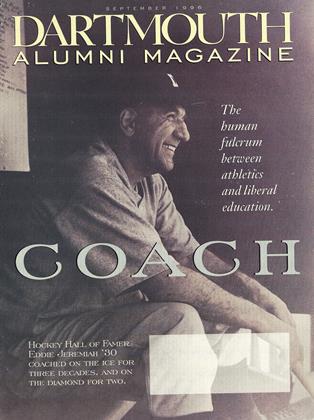An every issue guide to staying in touch with Dartmouth
To spontaneous applause, and some sense of relief, the Alumni Council unanimously voted in to approve its new constitution. (This is the seventh such amendment since its beginnings in 1913.) The new changes deal primarily with the ability of the Council to be more representative of a more heterogeneous body of alumni—and at the same time to improve communications between alumni and Alma Mater. This was best expressed under "Purposes"; "To act as a clearing house for, and principal spokesperson of, alumni sentiment to the administration and as an avenue of approach by which the administration may have access to the alumni collectively;"
A new Committee on Alumni Organizations (CAO) will be a slight revision of the list of alumni associations from which representatives to the Council are selected. (Other associations may request membership on application to the Office of Alumni Relations with reasons for their request, and they may be accepted by a majority vote of the Council.) Contact between existing organizations and their counterparts in Blunt and in Office of Alumni Relations will be strengthened. The method of selecting regional representatives was simplified, as another part of the attempt to make die Council less tinwieldy. There remains, it seemed, a question of length of terms of Council and committee chairpersons whether at present they can become familiar with their problems and establish some continuity of policy before they must leave office.
From beginning to end, animated discussions took place on a variety of such matters: the cost of an Ivy education; shortage of student housing; the burgeoning pervasiveness of e-mail; "voluntary social segregation," as Alumni Relations director Nelson Armstrong '71 put it; quality of student life; whether loyalty to the College is strongest because of class or of affinity; and, as outgoing Council president Otho Kerr '79 asked, are our problems more of apathy or of antipathy? President Freedman addressed the cost issue, agreeing that $1,000 a week for four years at Dartmouth was pretty high. But compare it with a hotel room at the Marriott costing $15O a day, he said equally expensive, but no board, no classes, no athletic facilities, no hospital care, no outdoor life, no endless opportunities to make lasting friendships.
Mentors in the Making: One of the more innovative class projects is DartmouthPartners in Community Service. Operated by a voluntary board of 22 '59ers who work closely with the College and the Tucker Foundation, the service recruits alumni mentors and local community service organizations across the country. The mentors help place undergraduate student interns in off-term community: service jobs. The president of the current DPCS board is Karl Holtzschue '59. "These are real work opportunities, not licking stamps," explains board member Doug Wise '59. The class raises the funds to support the students with stipends, and the board requires each student to submit a written report on the experience. Three seniors from the class of 1996 were selected to participate. Peter B. Evans worked as an intern for A Better Chance, the non-profit organization that places: academically talented minority student.in leading preparatory schools.Sonia Novoa's off term was at The Bridge, a New York mental health agency. Garcia Passley spent eight weeks with the Youth Employment Summer (YES) program in New York, which provides meaningful work to disadvantaged minority students.
Gary Dicovitsky '72 is the next Alumni Council president.
 View Full Issue
View Full Issue
More From This Issue
-
 Feature
FeatureThe Language of Innocence
September 1996 By KATE COHEN '92 -
 Cover Story
Cover StoryBAKER WAS THE BACKDROP
September 1996 -
 Feature
FeatureStaying Clear
September 1996 By Jeanet Hardigg Irwin '80 -
 Feature
FeaturePassion
September 1996 By Fiona Bayly '89 -
 Feature
FeatureConfidence
September 1996 By Paid Tsongas '62 -
 Feature
FeatureFaith
September 1996 By Seward, "Pat" Brewster '50
Article
-
 Article
ArticleINVESTIGATION OF JUNIOR PROM
June, 1912 -
 Article
ArticleHONOR SYSTEM ADOPTED BY THE THAYER SCHOOL
March 1920 -
 Article
ArticleRobert Frost's Homecoming
SEPTEMBER 1996 -
 Article
ArticleMedical School
October 1959 By HARRY W. SAVAGE, M' 27 -
 Article
ArticleThe Community College
March 1948 By HUGH MORRISON '26 -
 Article
ArticleMetropolitan Notes
December 1938 By Milburn McCarty Jr. '35.

